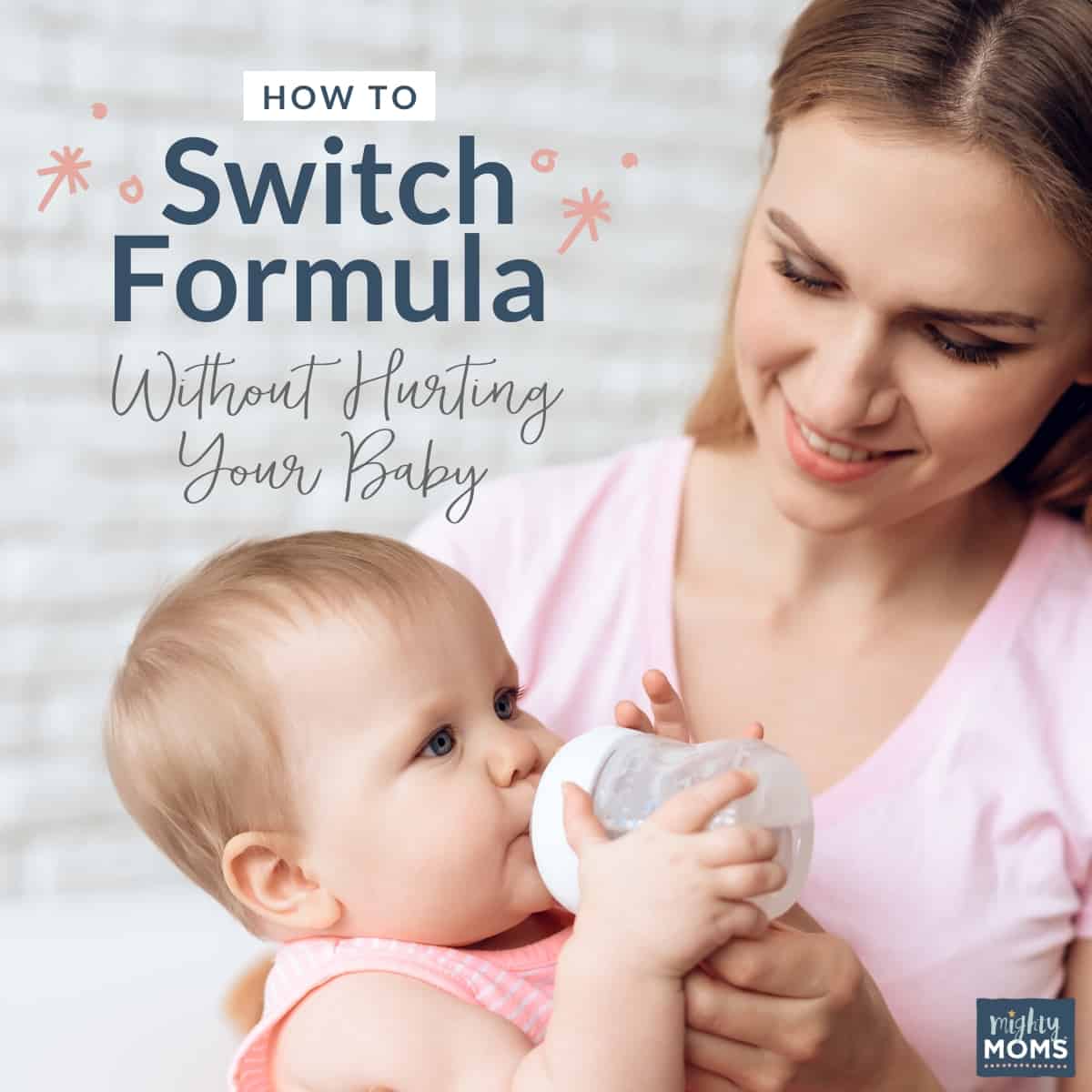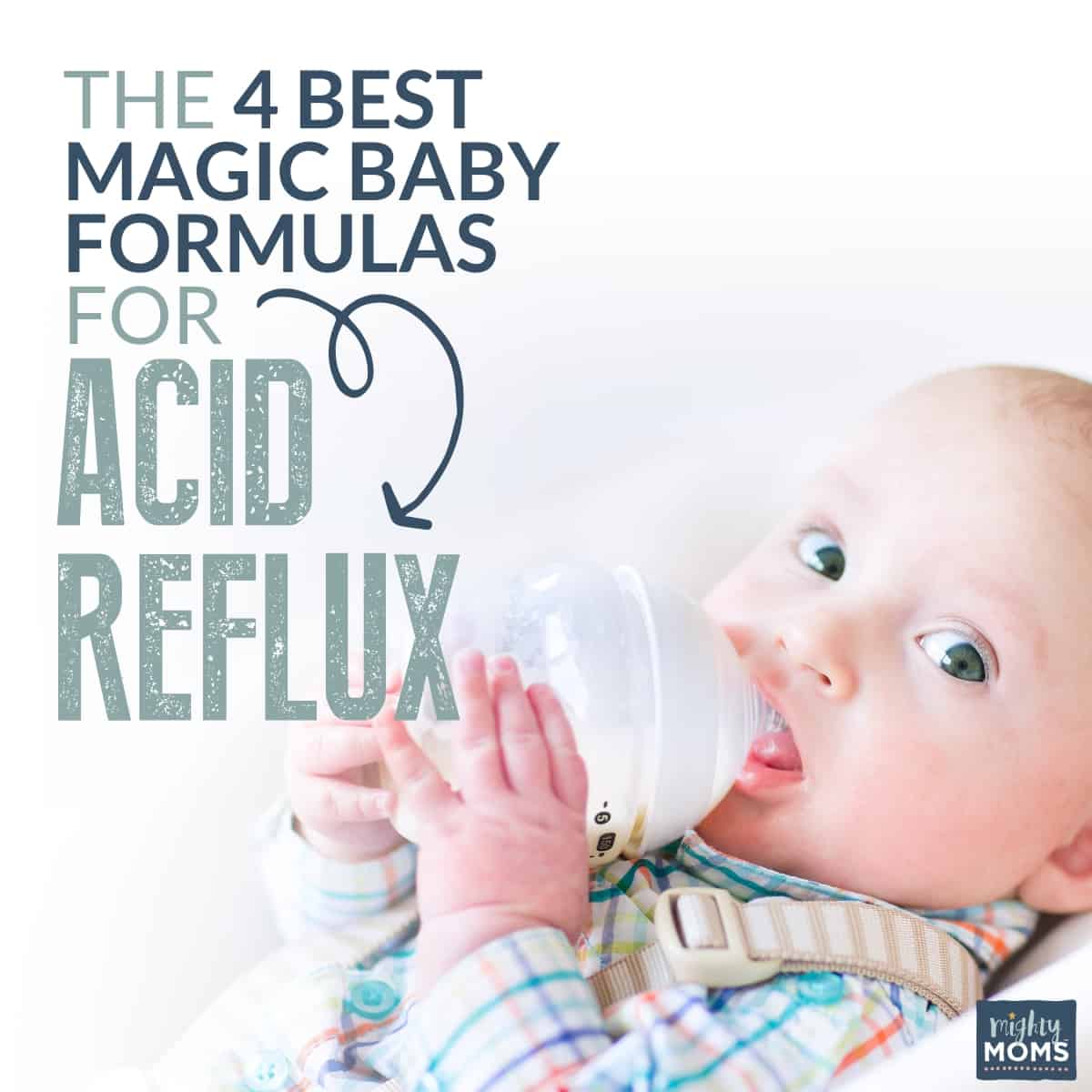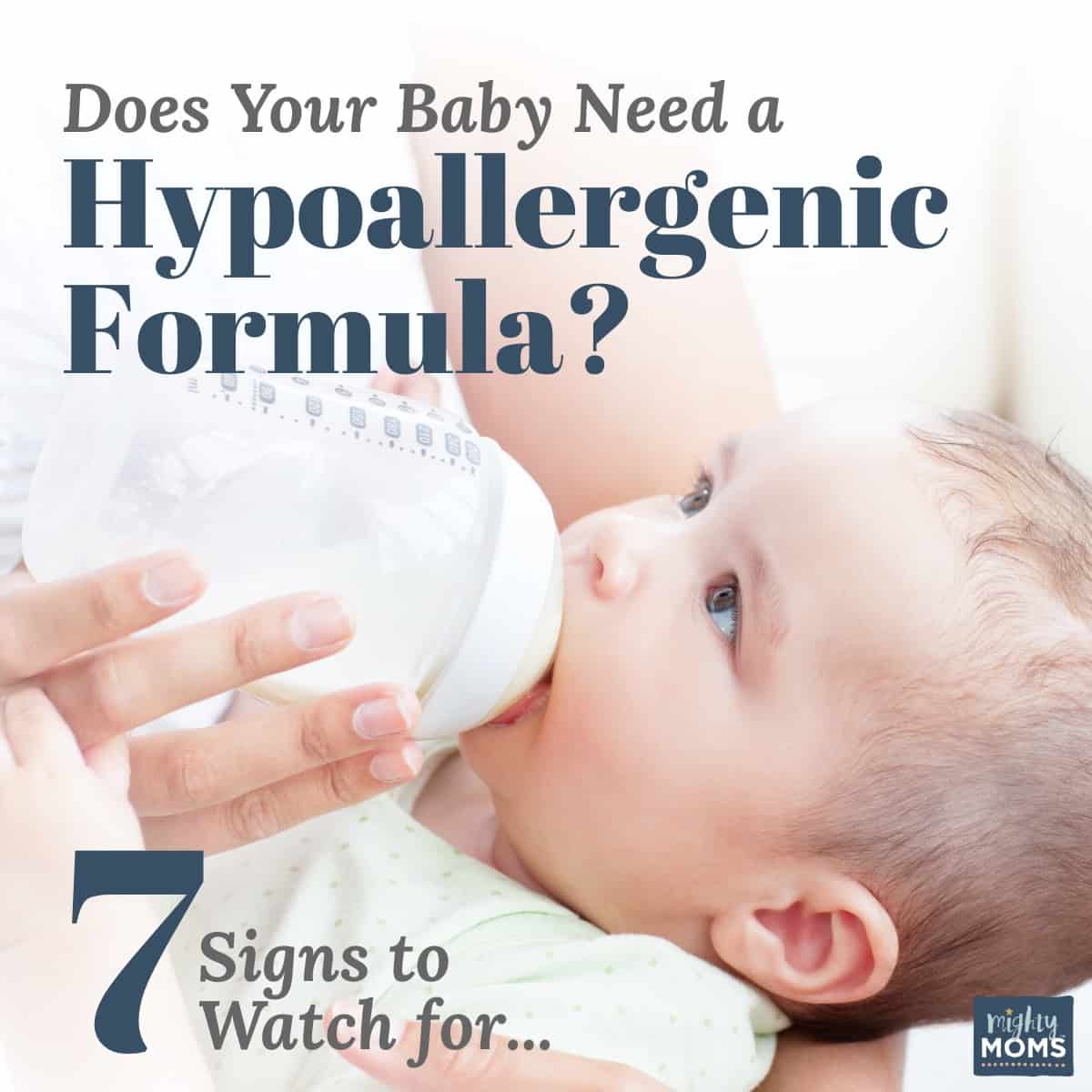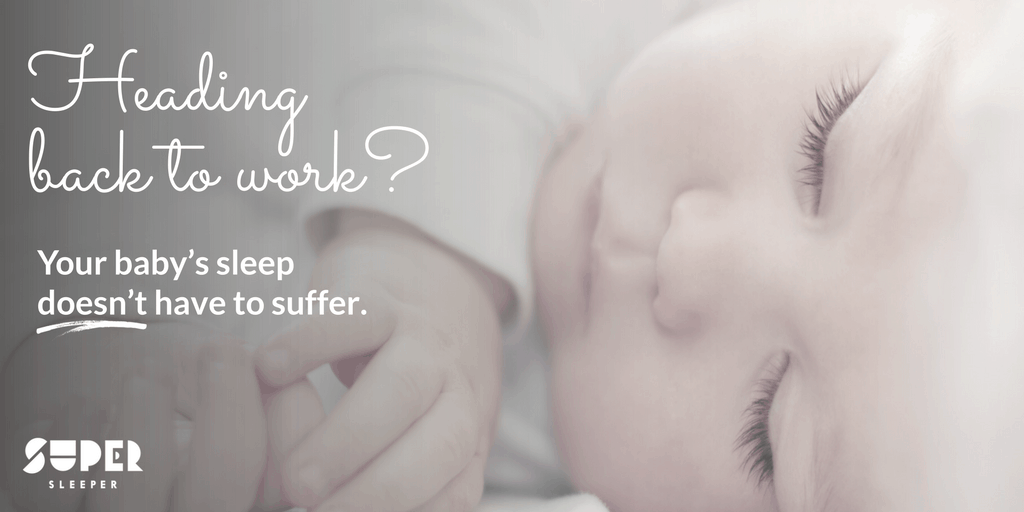In This Article...
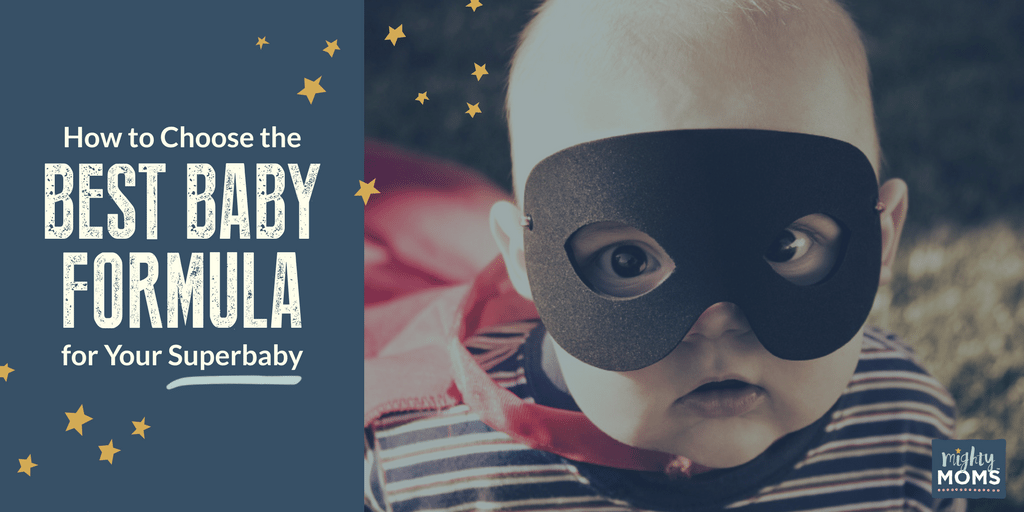
With all the types of formula floating around, choosing the best baby formula is a job for…SUPERBABY!
Faster than a distracted parent…
More powerful than a childproof lock…
And able to leap out of his crib in a single bound!
This miracle baby, using telekenisis, can tell you exactly which is the best baby formula. Without a single word being spoken.
*gasp*
Using the infamous Circle of Calming Cuteness, he brings an aura of clarity to an otherwise overwhelming problem: Which formula is best for my baby?
Here are the five questions that will enlighten you on which formula path to start flying down:
Best Baby Formula Question #1:
What Type of Formula Do You Need?
So first, let’s jump in with the whole cow/soy/goat/orangutan/llama milk debate.
Coming clean: I made up the orangutan and llama milk base. Sorry. — Or did I just give you a great new BUSINESS IDEA??
What source should you look for as a base to your best infant formula? There are four main groups to choose from.
Baby Formulas Based on Cow’s Milk
These are your usual standard American formula brands like Similac, Good Start, Enfamil or European formula brands like HiPP or Holle. They are usually the least expensive because they’re based on cow’s milk. (Unless you’re choosing organic European formulas.)
Cow’s milk formulas can be difficult for babies with milk allergies or if your child struggles with gas or constipation.
Baby Formulas Based on Goat’s Milk
I totally wish I had heard about goat’s milk formula when my kids were babies. It has a lot of great things going on:
- It’s naturally sweet, more like breastmilk.
- The whey/casein ration is closer to breastmilk, making it easier to digest and less likely to cause gassiness.
- It creates a smaller curd in the stomach during digestion, helping to prevent constipation.
- More and more studies like this one are showing how goat’s milk formula can help treat eczema. (Which my kids always struggled with.)
If you’re curious about whether a goat’s milk formula is the best baby formula for your child, you can go here and try it for free. It is labeled as a toddler formula, but is recommended for any baby over 6 months who has started eating solid foods.
If you want to try a goat’s milk formula on your newborn, Holle has a terrific organic option you may be interested in!
Baby Formulas Based on Soy Milk
Fewer babies are being fed soy milk these days, mostly because some studies have shown that soy milk can cause an estrogen increase among young boys. That said, there are some situations where soy milk may be a good choice.
If you’re thinking about using a soy formula, read this article first!
Hypoallergenic Baby Formulas
A hypoallergenic formula is one that has been specifically treated to be easier to digest. They are also significantly more expensive than other formulas.
Why do parents shell out the extra money for these formulas? Because they have been shown to be really helpful in helping to treat colic, acid reflux, and allergies! If you are struggling with a King Crankypants see if a hypoallergenic formula would help!
Best Baby Formula Question #2:
How Old is Your Infant?
Breastmilk naturally changes it’s nutritional content to match what your baby needs most to grow. Formula, even the BEST infant formula, can’t. So you’ll have to make the adjustments on your own.
- Premature babies will need to use a special formula for the entire first year of life. Enfamil Enfacare is packed full of the brain-nutrients preemies need.
- Once your baby starts eating solids at around 6 months, baby formula can fill in nutritional gaps picky-first-time eaters often have. This would be a great time to try goat’s milk formula for free. *wink*
- After the first birthday, using a toddler formula can provide him with more nutrients than plain whole milk.
Obviously, the best baby formula for a newborn isn’t going to look the same as for an 8-month-old! Your baby’s nutritional needs are changing!
Best Baby Formula Question #3:
Is Organic Important to You?
On a scale from 1 to 10, how important is it that your baby’s formula is labeled organic?
If you answered 15, take a few minutes to read through my article 3 Reasons American Parents are Loving European Baby Formulas.
Those Europeans…they really know their organic baby formulas. Honestly, if you’re going to choose organic, using a European formula provider like this one is the way to go. They have much stricter organic standards than we do here in America.
Best Baby Formula Question #4:
What Form Do You Want?
Did you know there are several different forms you can purchase baby formula? I’ve used each form at different times on my parenting adventure! Here’s how to decide which baby formula form would serve you best.
Are you trying to save money? Go powder.
Are you trying to save time? Go premixed.
Using Formula in Powder Form
Powder Pros: It’s less expensive (especially in bulk) and lasts longer in the pantry.
Powder Cons: It’s time consuming to mix and isn’t sterile (one reason you won’t find it being used in the NICU.)
You’ll save on money, but lose on time.
Which is more important to you? You also have 1 month between “opened” and “have to toss” in powdered form. A mixed bottle is good for 48 hours if refrigerated.
Using Premixed Formula
Premixed Pros: Sometimes (like when you’re traveling) it’s more convenient to purchase a nipple-ready premixed bottle.
Premixed Cons: Be prepared to pay about 20% more than the powdered kind.
You’re saving time, but losing money.
Still, using premixed containers on a trip is still cheaper than having to get your van detailed because you spilled formula all over the car vents when shaking up a not-quite-closed bottle.
Unlike the powdered kind, it is sterile, which gets a gold star in areas with “iffy” water. (My scientific term of the day.) You also only have 48 hours before the cans self-destruct. (JK, they expire.)
In regards to laundry, the premixed formula can stain clothing even worse than regular formula. (Avoid white, or buy a lot of bleach.)
Need some help getting those stains out? Bethany has come to the rescue! Check out her best tips for removing those stains from your favorite baby outfits!
Best Baby Formula Question #5:
How’s Superbaby Handling It?
Although the formulas all have to follow a long list of nutritional requirements (the FDA is very passionate about that), the way they put those ingredients together can make a big difference to how your baby digests it. (Plus, some babies just prefer the taste of one brand over another.)
So, to answer this last question, you’re going to have to use your Professor X mindpowers to tap into Superbaby’s secrets.
MWAH HA HA HA!!! Formula domination!
For the next three days, watch your little hero closely.
- Does he seem happy and content? Or gassy and fussy?
- Is he excited about mealtimes? or makes faces and spits out the nipple (doesn’t like the taste).
- Is he gaining weight? (Your weight – your weight holding baby = baby’s weight)
Observing these things, as well as the other allergy signs, can help you decided if you’ve settled on a winner, or need to go back to the list and pick again.
Don’t Worry.
You Can’t Screw This Up
Here’s the best news you’ll hear all day: When it comes to choosing the best baby formula for your child, you really can’t screw this up.
Like 99.9% of the rest of your parenting career, choosing a formula is going to involve a fair amount of trial-and-error. You’re going to make a decision, then test it for a while, then decide whether or not to continue or take a sharp right.
Start somewhere. Pick one of the formulas above, and then test it out for a few weeks. (You can always start over and pick another one!)
No allergy symptoms? Does he seem happy? No refluxing?
Sweet! Ride that train all the way to Toddlertown!
We ♥ honesty! This post contains affiliate links that provide extra money for our mutual coffee habits addictions. Click here to learn more. As an Amazon Associate I earn from qualifying purchases.
